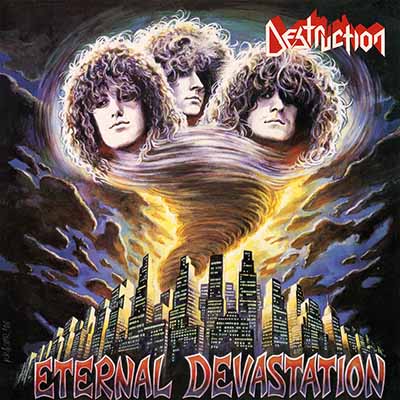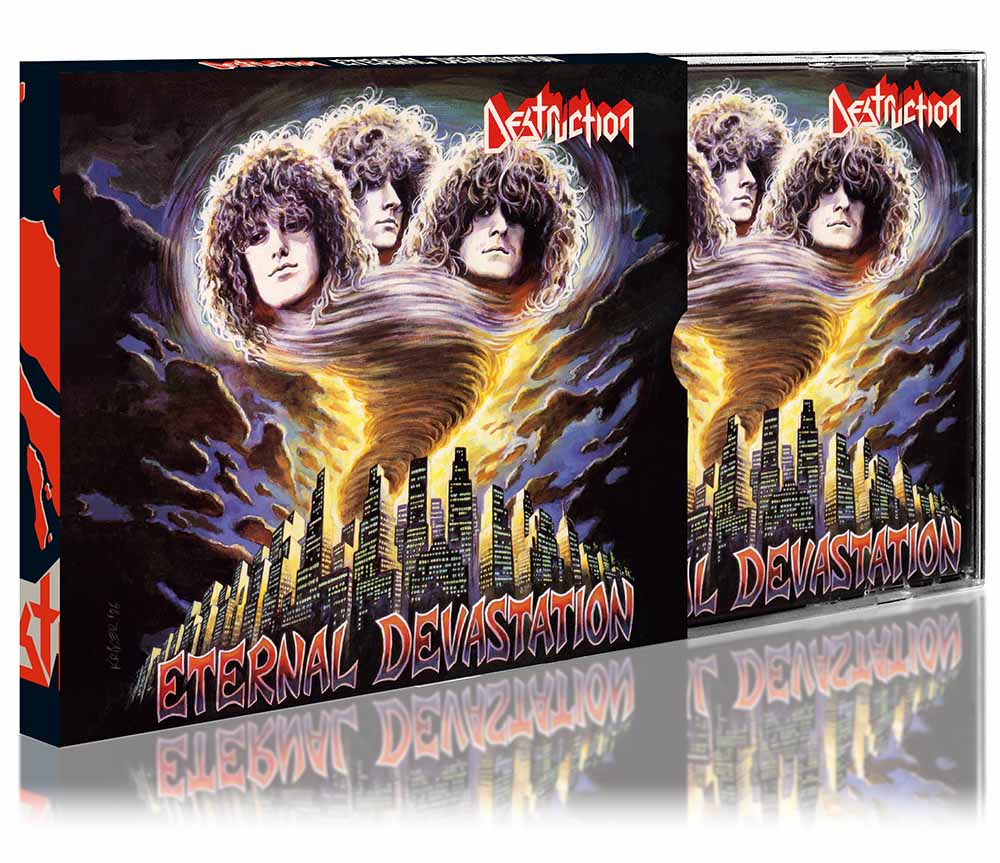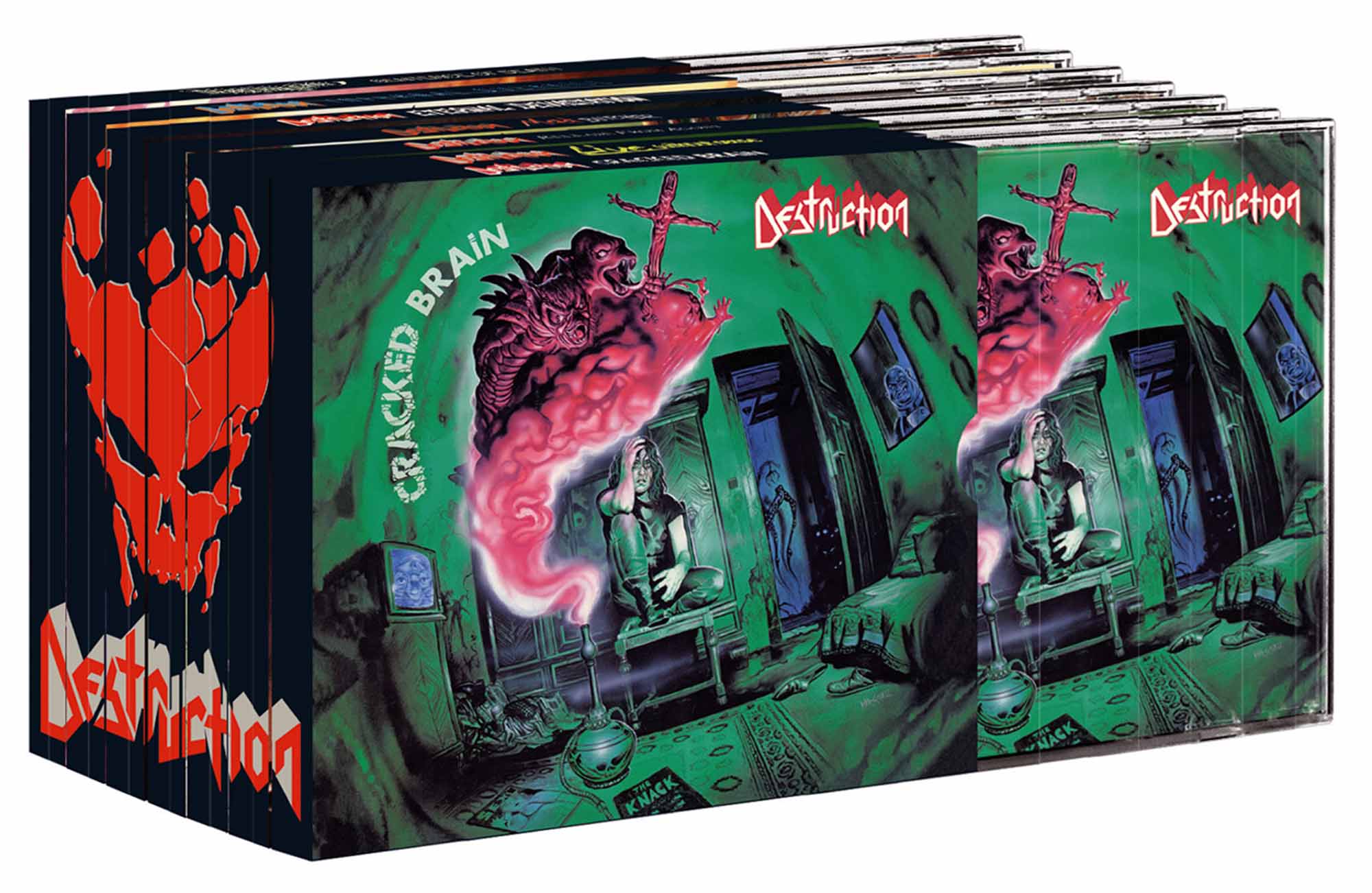 | ||||
| DESTRUCTION - Eternal Devastation CD | |
HRR 547 CD, slipcase, poster | |
| Schmier - Bass, Vocals Mike Sifringer - Guitars Tommy Sandmann - Drums | |
| 1. Curse the Gods 2. Confound Games 3. Life Without Sense 4. United by Hatred 5. Eternal Ban 6. Upcoming Devastation 7. Confused Mind | |
AVAILABLE | |
Remastered by V.O. Pulver at Little Creek Studio
“Eternal Devastation” is Destruction’s second full-length album. Released in 1986, it showed a band that had moved away from their early, more black metal influenced style towards a “purer” form of thrash. Was that a conscious choice the band had made? Schmier explains: “I think it was just a very natural progress. Mike had so many great riffs for this album, we did not really think about the direction we were going into, we just did what felt right. Also, I had started to write more lyrics, so the dark outlook of our earlier songs gave way to more socially critical topics. I would say the album is more grown up and more mature. In hindsight it is always easier to understand what happened. I guess musicians always want to move on and that’s what happened. My most favourite Destruction songs from Eternal Devastation are still these two: ‘Curse The Gods’ and ‘Life Without Sense’.”
When putting out their sophomore album, many bands tend to have the feeling that they have to prove themselves as a band, or to meet some particular expectations that fans and press have. Was that also the case with “Eternal Devastation”? Guitarist Mike has the answer: “No, there was no fear at all. It’s never useful to get nervous and it also makes no sense to listen to everybody’s opinion. We just practiced a lot and tried to become better musicians.”
“Eternal Devastation” was recorded “in April 1986 in a small studio in a small Bavarian town called Hilpoltstein”, recalls Schmier. “But I don’t remember, who came across the idea to choose this particular studio. We were pretty much left alone with the producer.” Despite these obscure circumstances, the album turned out great, and both press and fans received it very well. Schmier: “Yes, reactions to the album were very good. Mike finally got some credit and recognition from the scene. In the beginning, nobody took us serious, for most journalists we were just a hell lot of noise. ‘Eternal Devastation’ was the record that established us as a band on the European market. We did our first headline tour, but then also the first line-up changes occurred. When we were still in the studio, Tommy told us already that he would leave the band... that was devastating!” Losing Tommy wasn’t only difficult for the band, but also for Destruction’s original drummer himself: “It was very hard for me as a die-hard enthusiast to make that sad decision to leave the band. But I decided to free the drum seat for someone else, who would be able to help the band to achieve the next level. That’s when Olly came in…”
“Eternal Devastation”, the record which brought all those dramatic changes about, is still regarded as one of the most important Destruction albums and repeatedly makes it into any “Top 10 of (German) Thrash Records” list you find anywhere on the internet. It gets a lot of praise for its innovative and ingenious riffing and soloing, masterfully executed by Mike Sifringer, and for Schmier’s acrid signature vocal style, that had become even more distinctive and unique than on the previous recordings. Mike tells us about his own favourite feature of ‘Eternal Devastation’: “I’m pretty proud of ‘Curse The Gods’. I still like the lyrics a lot and the riffing is kind of unique. Religious people may hate it, I know. But it’s against war!” Schmier already hinted to the new stance Destruction were taking on “Eternal Devastation”: The band had put some work into the lyrics, which had turned out a lot more serious than before. Instead of just railing against Christianity, as so many other black/thrash-influenced bands did, their lyrics dealt with the problematic aspects of religion as such, e.g. in “Curse the Gods”, and Destruction also addressed some serious social issues, e.g. in “Life Without Sense”, which criticises the general lack of acceptance for disabled people. What did it mean to them to write and sing lyrics like these? Schmier: “There is a big difference to writing lyrics when you’re a wild angry teen compared to when you are a bit older and more experienced. When you’re starting out, maybe your English isn’t very good and your band has just started to write songs. A couple of years later, when you have achieved serious success and have grown both artistically and personally, you become aware that people might actually listen to what you are singing about. All of a sudden it was a completely different game. Our youthful carelessness turned into a more responsible and artistic approach, but we were still pissed off and wanted to kick some conservative asses – but with more style!”
The sound of “Eternal Devastation” is definitely ass-kicking: it is sharp and clear but also very abrasive – had Destruction worked for that or did it just happen? Mike: “We wanted a sharp, aggressive guitar sound. The result came out a bit extreme, a touch too much, maybe. But a lot of people like that and say it’s the trademark of the album.” Tommy adds his view on the way the album influenced the development of his former band: “At that time we decided to go into a more technical direction. Still fast though, of course, but with more tempo changes and some – for our standards – progressive elements. I liked the stuff!”
Now let’s quote one reviewer: “The second full-length of the restless three-piece expresses the attitude of the metal scene of the mid-eighties. As a real child of its time, it reflects the pioneering spirit of a more or less rebellious youth.” Would the band themselves agree to that? Can “Eternal Devastation” stand as a “representative” both of a whole scene and of a whole period? Schmier tries to give an answer to this: “It really stands for our spirit, and as we have reached a lot of people that supported us at that time, it surely was a statement against the commercial music scene of the early 80s. I would even call it a little rebellion... Nobody really wanted us, we just kicked our way in. But not all of the metal scene was like that. You know, there was this big posers-versus-thrashers fight going on. It was mad! They did not take us serious and we hated their commercial aspect of playing Rock ‘n’ Roll! Hahaha... Funny to look back at that ‘cause nowadays, I’m friends with a lot of those bands ‘cause we all stood the test of time!”
The cover artwork for “Eternal Devastation” was contributed by German artist Sebastian Krüger, who began his career as a designer of numerous cover spreads for the press and as an illustrator of various LP covers, before he gave up on commercial work and solely concentrated to free painting. Mike recalls how the band got in touch with him – did Krüger maybe come up with the idea for that very hairy cover image? “No, we told him about the concept and he did a great job. I remember that my girlfriend came up with ‘Uproaring Devastation’ as an idea for an album title, well, the rest is history.”
Following the release of “Eternal Devastation”, Destruction went on tour with Kreator and Rage. Schmier shares his best memories from that tour: “Definitely the friendship that grew on that tour between the bands. We felt like a united scene, like something special had happened! And this friendship has lasted for decades, and still does. And of course, the first headline tour in your own nightliner makes you feel like a real rock star, after all the weekend shows in vans we did at the beginning. It felt fantastic til the tour was over and we learned that we had earned no money at all... Hahaha!”
Releasing ‘Eternal Devastation’ via High Roller Records will hopefully be a lot less disappointing, and Schmier seems quite certain about that: “First of all let me tell you that High Roller Records did such a great job visually and audio-wise. And just as we did for ‘Infernal Overkill’, we unearthed the lyrics to the songs to have them printed for the very first time, along with some old pix. The HRR edition will also include a poster of the front cover – it’s fantastic!” Agreed.
Ulrike Schmitz

